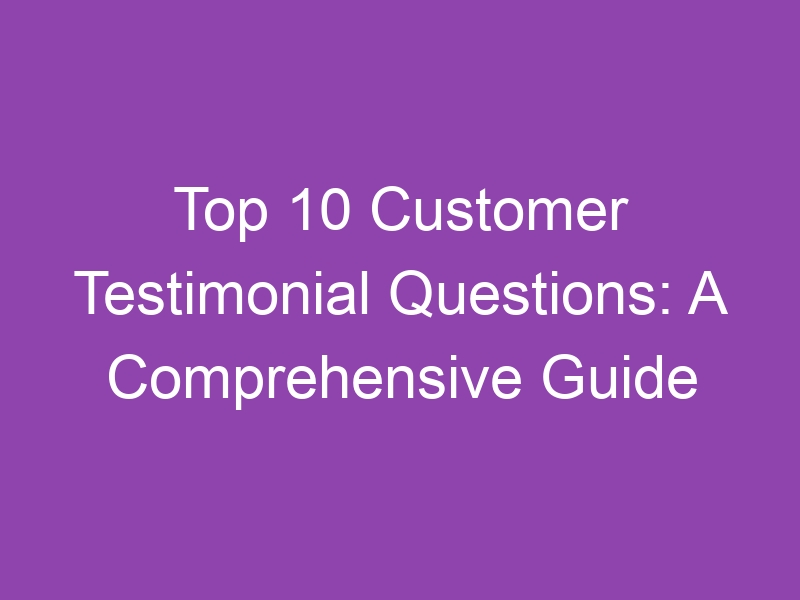Content Outline
- Introduction
- A. Definition of Customer Testimonials
- B. Importance of Customer Testimonials
- Step 1: Ask for Testimonials
- Step 2: Make it Easy for Customers to Provide Testimonials
- Step 3: Showcase Testimonials on Your Website and Social Media
- Step 4: Respond to Testimonials and Say Thank You
- Step 5: Respecting Customer Privacy and Autonomy
- Conclusion
Introduction
Customer testimonials are a powerful tool for businesses looking to build trust and credibility with potential customers. According to a study by BigCommerce, 92% of consumers read online reviews before making a purchase, and 72% say positive reviews make them trust a business more. However, getting customers to leave testimonials can be a challenge.
Why Are Testimonials Important?
- Testimonials help build trust with potential customers who may be hesitant to try a new product or service.
- They provide social proof that your product or service is effective and valuable.
- Testimonials can also help with SEO by providing fresh, user-generated content for your website.
How to Get Customer Testimonials
There are several strategies businesses can use to encourage customers to leave testimonials:
- Ask for feedback directly: Reach out to customers via email, social media, or in-person and ask for their thoughts on your product or service.
- Incentivize reviews: Offer a discount or other incentive for customers who leave a review.
- Make it easy: Provide a simple and user-friendly platform for customers to leave reviews, such as a review widget on your website or a link to a third-party review site.
By implementing these strategies, businesses can increase the likelihood of receiving valuable customer testimonials that can help build trust with potential customers and improve SEO.
Introduction – A. Definition of Customer Testimonials
When it comes to building trust with potential customers, there is no better tool than customer testimonials. These are statements made by satisfied customers about their positive experiences with a product or service.
Customer testimonials can be incredibly effective in increasing sales and revenue. According to a survey by BrightLocal, 85% of consumers trust online reviews as much as personal recommendations. This means that having positive customer testimonials on your website or social media platforms can greatly influence a potential customer’s decision to buy from you.
It’s important to note that customer testimonials must be genuine and unbiased in order for them to be effective. This means that you should never pay for reviews or ask customers to provide a positive review in exchange for a discount or other incentive. This can damage your reputation and lead to legal issues.
Key factors to consider when collecting customer testimonials:
- Timing: Ask for a testimonial when the customer has just had a positive experience with your product or service.
- Format: Consider the format of the testimonial. Written testimonials are great, but video testimonials can be even more powerful.
- Permission: Always ask for permission before using a customer’s testimonial on your website or other marketing materials.
- Follow-up: After receiving a testimonial, follow up with the customer to thank them and ask if they have any additional feedback.
In conclusion, customer testimonials are a valuable marketing tool that can help increase trust and sales. By following the key factors outlined above and ensuring that your testimonials are genuine and unbiased, you can effectively use customer testimonials to grow your business.
Introduction – B. Importance of Customer Testimonials
In today’s world, where customers have endless options to choose from, having a loyal customer base is crucial for any business. One of the most effective ways to build trust with potential customers is through customer testimonials. In fact, according to BigCommerce, displaying customer reviews can increase conversion rates by up to 270%.
Customer testimonials provide social proof and validate the quality of your product or service. When potential customers read positive reviews from your current customers, they are more likely to trust your business and make a purchase. Additionally, customer testimonials can help your business stand out from competitors, as they showcase the unique benefits and value your business offers.
Why are customer testimonials important?
- Build trust with potential customers
- Provide social proof for the quality of your product or service
- Increase conversion rates
- Showcase the unique benefits and value your business offers
- Help your business stand out from competitors
While customer testimonials can be powerful, it’s important to note that not all testimonials are created equal. To ensure your testimonials are effective, they should be specific, detailed, and authentic. According to Crazy Egg, testimonials that mention specific results or experiences are more persuasive than general statements. Additionally, including the customer’s name and photo can increase the authenticity of the testimonial.
In conclusion, customer testimonials are a valuable asset for any business looking to build trust with potential customers and increase conversion rates. By showcasing specific, detailed, and authentic testimonials, businesses can effectively communicate the unique benefits and value they offer.
Step 1: Ask for Testimonials
Asking customers for testimonials is one of the most effective ways to gather social proof for your business. Not only do testimonials help to establish trust with potential customers, but they also provide valuable feedback that can be used to improve your products and services.
When asking for testimonials, it’s important to make the process as easy as possible for your customers. Here are a few tips to help you get started:
- Reach out to customers who have recently purchased from you and ask if they would be willing to provide a testimonial.
- Provide a template or questionnaire that makes it easy for customers to write their testimonial.
- Offer an incentive, such as a discount or free product, to customers who provide a testimonial.
Remember, the key to getting great testimonials is to make the process as easy and rewarding as possible for your customers.
According to a survey conducted by BrightLocal, 91% of consumers read online reviews when searching for a local business, and 72% of customers say that positive reviews and testimonials make them trust a business more.
By asking for testimonials, you can not only improve your online presence, but also gain valuable insights into what your customers love about your business.
Step 2: Make it Easy for Customers to Provide Testimonials
Customer testimonials are a powerful tool to build trust and credibility with potential customers. However, getting customers to provide testimonials can be challenging. Here are some tips to make it easy for customers to provide testimonials:
- Ask for testimonials directly: Reach out to your satisfied customers and ask them to provide a testimonial.
- Provide a template: Make it easy for customers by providing them with a template or suggested questions to answer in their testimonial.
- Offer an incentive: Consider offering a small incentive, such as a discount or free sample, to customers who provide a testimonial.
- Follow up: If a customer agrees to provide a testimonial, follow up with them to ensure they follow through.
By implementing these strategies, you can increase the likelihood of customers providing testimonials for your business.
According to BigCommerce, customer testimonials can increase conversions by up to 270%. Therefore, it is important to make it as easy as possible for customers to provide testimonials.
Step 3: Showcase Testimonials on Your Website and Social Media
One of the most effective ways to build trust with potential customers is by showcasing testimonials from happy clients. According to a study by BigCommerce, 92% of consumers read online reviews before making a purchase, and 72% of consumers say positive reviews make them trust a business more.
Here are some tips for showcasing customer testimonials:
- Include testimonials on your website’s homepage and product pages.
- Use social proof by showcasing the number of satisfied customers you have served.
- Feature testimonials in your email marketing campaigns and newsletters.
- Showcase testimonials on your social media profiles and in social media ads.
- Use video testimonials to add a personal touch and increase engagement.
Remember, the key to effective customer testimonials is authenticity. Don’t be afraid to ask your happy customers for feedback and feature both positive and constructive criticism. By showcasing genuine customer experiences, you can build trust and credibility with your audience and increase the likelihood of converting potential customers into loyal ones.
Step 4: Respond to Testimonials and Say Thank You
After you have received customer testimonials, it is important to respond and say thank you. This not only shows appreciation for their feedback but also helps to build a strong relationship with your customers.
When responding to customer testimonials, make sure to personalize your message and address them by name. This shows that you have taken the time to read their feedback and value their opinion. Additionally, it is important to use this opportunity to reinforce your brand message and highlight the benefits of your product or service.
According to a study by Qualtrics, 92% of consumers read online reviews and testimonials before making a purchase decision. Therefore, responding to testimonials not only helps to build trust with your current customers but also helps to attract new customers.
When responding to testimonials, make sure to:
- Thank the customer for their feedback
- Personalize your message and address them by name
- Reinforce your brand message and highlight the benefits of your product or service
By following these simple steps, you can turn customer testimonials into a powerful marketing tool for your business.
Step 5: Respecting Customer Privacy and Autonomy
Respect for customer privacy and autonomy is at the heart of asking for permission. In an era dominated by concerns about data privacy and online security, customers increasingly value their control over personal information. By seeking consent before featuring their testimonials, businesses demonstrate a profound respect for customers’ rights to determine how their experiences and opinions are shared with the wider world.
Conclusion
Getting customer testimonials is crucial for any business looking to establish credibility and trust with potential customers. By following the steps outlined in this post, you can increase your chances of receiving high-quality testimonials that will boost your conversion rates and help you stand out from competitors.
- Start by identifying the right customers to ask for testimonials
- Make the process easy for customers by providing clear instructions and guidelines
- Use social proof to your advantage by showcasing testimonials on your website and social media channels
- Don’t be afraid to incentivize customers to leave a testimonial
- Respond to testimonials in a timely and professional manner
Remember, the key to getting customer testimonials is to provide exceptional customer service and a positive customer experience. By focusing on these factors, you can increase your chances of receiving glowing reviews from satisfied customers.
For more information on how to get customer testimonials, check out these resources:




